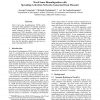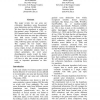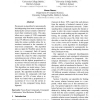104 search results - page 4 / 21 » Word Sense Disambiguation by Relative Selection |
CICLING
2009
Springer
14 years 8 months ago
2009
Springer
We propose a supervised word sense disambiguation (WSD) system that uses features obtained from clustering results of word instances. Our approach is novel in that we employ semi-s...
CAISE
2004
Springer
14 years 23 days ago
2004
Springer
The so-called Semantic Web vision will certainly benefit from automatic semantic annotation of words in documents. We present a method, called structural semantic interconnections ...
IJCAI
2007
13 years 8 months ago
2007
Most word sense disambiguation (WSD) methods require large quantities of manually annotated training data and/or do not exploit fully the semantic relations of thesauri. We propos...
CORR
2000
Springer
13 years 7 months ago
2000
Springer
This paper revisits the one sense per collocation hypothesis using fine-grained sense distinctions and two different corpora. We show that the hypothesis is weaker for fine-graine...
ACL
2006
13 years 8 months ago
2006
We present an algorithm for automatically disambiguating noun-noun compounds by deducing the correct semantic relation between their constituent words. This algorithm uses a corpu...



